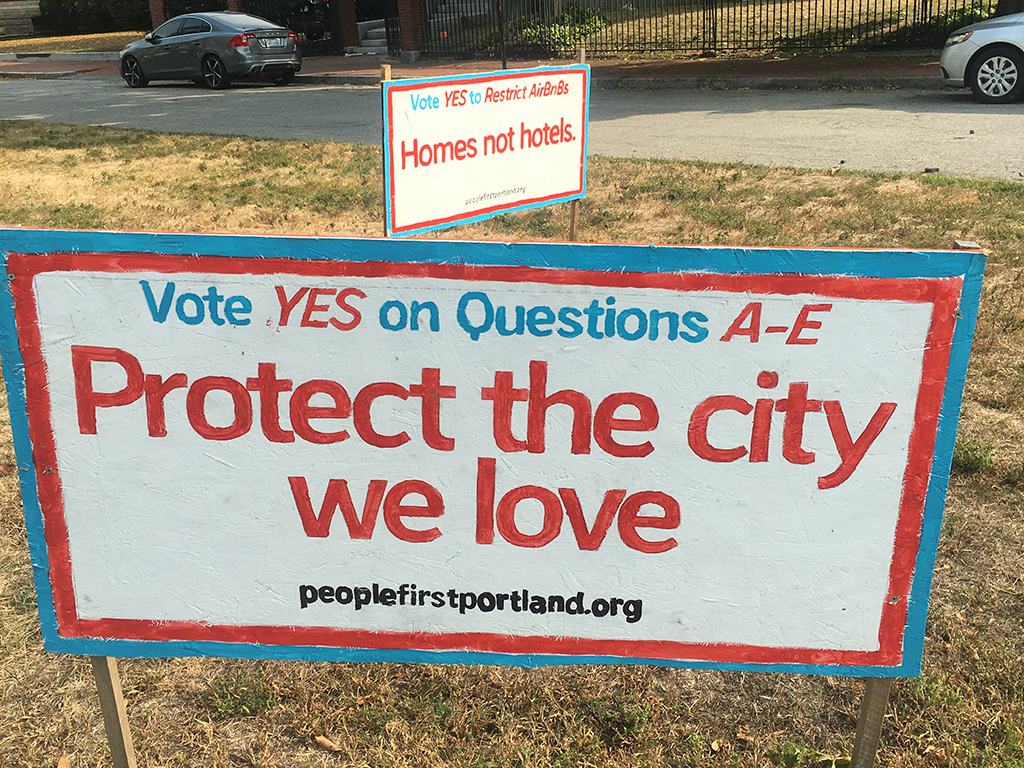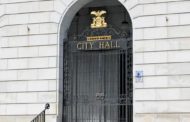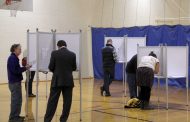By Tony Zeli
Portland voters will decide on six local ballot question measures this November. Five of six questions are being raised by People First Portland, a local volunteer-based progressive group whose organizers hail from the ranks of the Berniecrats and Democratic Socialists. These questions contain a lot of legislation and any one of them could be transformative for the city. How are voters to make an informed decision?

Organizers are trying to get the word out, but as People First Portland campaign organizer Glen Gallik noted, “…we’re not going to be going door-to-door talking with people – the risks are just too high.” Gallik was concerned about misinformation being spread but encouraged voters to ask themselves what their lives might be like if these referenda were to pass.
Jake Karaisz, also a campaign organizer with People First Portland agreed. He noted the pandemic would make it difficult to inform voters and “rallies and big events are out of the question,” but you may see People First Portland out tabling and trying to safely reach voters.
For those Portland voters who want a deeper dive, you can find the complete ordinance language for all the referenda on the City of Portland website.
For a more digestible summary of key elements, here is an outline of each Portland ballot question.
Portland Ballot Question A – Minimum Wage
- Increases the minimum wage to $15/hr. over 3 years
Asks voters to increase the minimum wage by $1 per hour every year until it reaches $15 in 2024. After, it increases with inflation each year. The last time the minimum wage was raised in Portland, it was set to $10.68 per hour. That law was superseded by the state law passed by voters in 2016. Currently the minimum wage in Portland, and the rest of Maine, is $12 per hour. And the tipped wage is $6/hr.
- Increases the tipped employee wage to 50% of the minimum wage
Employers would pay workers who receive tips in Portland half the minimum wage, reaching $7.50 per hour once the minimum wage reaches $15. If tips do not make up the difference up to the $15 minimum, the employer pays the difference.
- Requires 1.5x the minimum wage during a state of emergency
For instance, if the minimum wage were $12/hr., and the State of Maine or the City of Portland issued emergency proclamations such as the emergency orders declared during the current Covid-19 pandemic, work performed during that emergency would be paid at 1.5 times the minimum wage. At the current minimum wage rate, the hazard pay increase would equal $18/hr. By 2024, at a new $15 minimum wage, the minimum hazard rate would be $22.50. This higher rate of pay would not apply to employees whowork from home.
Portland Ballot Question B – Facial Surveillance Ban
- Bans the use of facial surveillance software on groups or members of the public
Portland councilors voted unanimously in August to ban the use of facial recognition technology by the City. Councilor Pious Ali first proposed the ban in November 2019, but the council did not approve it until after demands issued by Black Lives Matter organizers. All this occurred after the referendum had already made the ballot. The city’s top attorney has said that if the question is approved by voters in November, it will take the place of the current ban. And it goes considerably farther.
- Provides the right to sue and collect damages
If facial surveillance data is illegally gathered or used as evidence, allows for civil action against the City of Portland and its contractors. Also allows for damages of up to $1,000 plus attorney’s fees.
- Allows your cell phones
Exempts the use of facial recognition on privately owned consumer devices and when used to manage secure entry like at health care facilities.
Portland Ballot Question C – Green New Deal
- Requires publicly funded buildings to use up-to-date environmental standards…
Requires all building projects receiving $50,000 or more in public funds granted by the City, such as affordable housing projects, be built using up-to-date environmental building standards, LEED Silver Standard to be specific.
- …and be built with solar-ready or living roofs
To aid stormwater management and promote biodiversity, living roofs may include roof gardens, green roofs, landscaped roofs, and such.
- Workers on these projects receive extra pay and training
Workers would be required to take a 10-hour training course for safety. Also, firms must pay prevailing wage rates set by the city or state depending on which is higher.
- Strengthens workforce housing requirements
Currently 10% of units in new building developments (of 10 units or more) must be affordable to people making 100% of Area Median Income (AMI). This question asks to raise these requirements to make 25% of units affordable to those making 80% AMI. Also, asks to increase the fee developers must pay to opt out of this requirement from $100,000 to $150,000 per unit.
- Creates an annual report detailing the city’s use of fossil fuels
To include information such as listing all new buildings built in Portland with green building technologies and an assessment of the benefits of adopting this policy.
Portland Ballot Question D – Tenants’ Rights
- Caps most annual rent increases to the rate of inflation
A Base Rent is created for all registered units ($50 to register) based on current rental agreements, as of June 1, 2020. Notable exempted units include public housing and owner occupied multi-units with four or fewer units. Other exemptions include hospitals, dorms, and churches.
- Housing Safety Office establishes an Allowable Increase Percentage and a Tax Rate Rent Adjustment annually
In addition to an Allowable Increase Percentage (based on inflation), if the mil rate is increased in the City, then a property owner may get an additional Tax Rate Rent Adjustment of up to 5%. There are other mechanisms to increase the rate rent can go up, too. For instance, when a new tenant moves in (up to a 5% increase). However, under no circumstances may a property owner raise the rent of a unit by more than 10 percent in any given year. Tenants may appeal these increases with the rent board that this referendum would establish.
- Incentivizes property owners to provide 90-day notice for evictions
Property owners must give 90 days’ written notice to the tenant before they can terminate tenancies-at-will.
- Creates a tenant/landlord board to review rent increases and settle disputes
The city council appoints 12 members, 7 to fill at-large seats and 5 from each of the city council districts. Suggests appointing no more than 3 property owners and at least 3 tenants. Members serve without compensation for 3-year terms that would be staggered so 3 seats are up every year.
This board would have the power to:
- Decide on applications for rent increases greater than those allowed by the ordinance
- Grant or deny appeals from tenants regarding housing safety
- Mediate and resolve tenant disputes and impose fines
Portland Ballot Question E – Restrict Short Term Rentals (STRs)
- Restricts all mainland STRs to only those that are owner-occupied
Current city code allows STRs in non-owner occupied buildings but they are limited to no more than 400 units on the mainland. This question asks to ban them altogether on the mainland, but not islands. Short-term rentals (STRs) would only be allowed in owner occupied buildings that are the owner’s primary residence.
- Simplifies and increases fees on STRs
Currently fees range from $100 to $4,000 depending on whether a unit is owner occupied or on an island. This question asks voters to simplify, with $1,000 for the mainland and $400 on Portland’s islands.
- Increases penalties for violations, creates a log for complaints, and allows the city to revoke licenses for violations
The city may impose fines of $1000 per day for the first offense, $1500 per each additional offense, for operating an unregisterd short-term rental. And the permitting and inspections department can decline a STR registration if there are public complaints (which will be logged and made publicly available) that have not been resolved within 1 week.
Portland Ballot Question F – Remove Cap on Cannabis Retail Stores
- Reduces distance between establishments
Asks voters to reduce the required distance between marijuana retail facilities and dispensaries from current 250 feet to 100 feet.
- Removes the cap on the number of marijuana retail stores
City code currently limits marijuana retail stores and dispensaries in the City to no more than 20.





